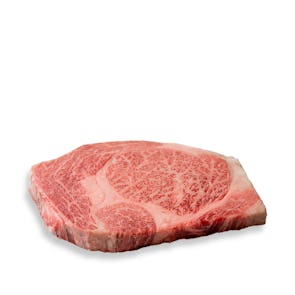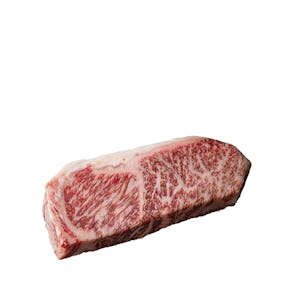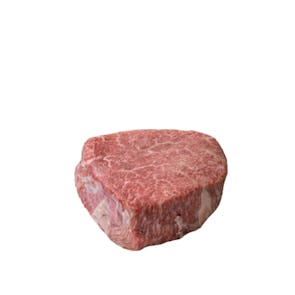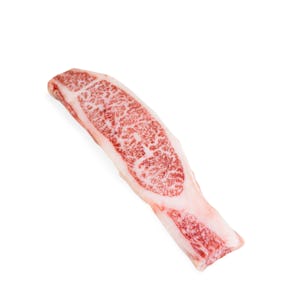- Categories
- Brands
- Origin
- Sort by: Recommended
Kobe Beef
How is Kobe Beef Made
Kobe beef in Japan is strictly regulated by a board called the the Kobe Beef Marketing and Distribution Promotion Association (神戸肉流通推進協議会 or Kōbeniku Ryūtsū Suishin Kyōgikai). There following conditions need to be met in to order for a Kobe Beef to maintain its trademark:
It must come from the Tajima cattle breed raised in the Hyōgo Prefecture, Japan. The cattle must be ultimately born, raised and processed in Hyōgo Prefecture. The grade must be at least an A4 or higher with a BMS of at least BMS 6. There are also weight factors to consider. The gross weight of Kobe Beef produced from a single animal must be at max 470 kilos or 1036 pounds. The end result is a beef that has a consistent fine meat texture and the correct firmness. Once passed, the beef is marked with a Japanese Chrysanthemum as part of their guidelines.
Kobe beef is its own specific brand of Wagyu and there are various sources who argue that what they carry is certified. It is important, however, to note that neither Kobe-Style Wagyu beef nor Kobe beef that do not have the specific certificate/marking, can be qualified under the legitimate Kobe Beef brand. Strict standards are imposed on the availability of Kobe Beef worldwide, thus the tight supply. Only between 3000 to 4000 head of cattle qualify as authentic Kobe cattle each year.
Kobe Beef VS Wagyu Beef
Kobe Beef and Wagyu Beef are terms often mistaken as one and the same but they are in fact, very distinct. Although Kobe Beef is considered a kind of Wagyu Beef, it cannot be applied vice-versa. Kobe Beef will always ultimately follow the strict certification and standards while Wagyu Beef describes the general scope of “Japanese Cattle” and have no regard to standards pertaining to breed. In fact, Wagyu Beef can come from one (or a mix) of these four breeds: Japanese Black, Japanese Brown, Japanese Polled, and Japanese Shorthorn.
The only common factor between both Kobe Beef and Wagyu Beef is that both cattle are bred in Japan. There is a ban on exporting of any Wagyu cattle which was implemented in 1997 when Wagyu was first declared a national treasure of Japan.
Kobe Beef Myths vs Facts
Kobe Beef has been a worldwide, sought after beef. It is so legendary that sometimes it gets harder and harder to separate fact from myth. One of the most common myths is that Kobe cattle are given beer and that they get special massages. Most of the strict regulatory processes for Kobe Beef are kept hidden under a veil so it is quite hard to really pinpoint the validity of these claims. As for the beer, some farmers may do them and some don’t. Beer is said to be given to Kobe cattle to induce appetite which results in them eating more and getting fatter. But this is not part of the Kobe Beef regulations, therefore, there is a big grey area on this. Nevertheless, these pampered luxury claims are part of the public’s fascination with Kobe Beef.
What is true about Kobe Beef is that the cattle are grass-fed (unlike Wagyu Beef that relies on a mix of grass and grain. Kobe Beef is not Halal and only because of the strict rule that Halal beef require the slaughtering house to bring in a qualified Muslim slaughterer who is a Muslim practicing. It is, however, safe to eat and not haram, forbidden.
Eating Kobe Beef
Kobe Beef is best eaten as a steak as it has the creamiest, most decadent, most flavorful streaks of fat a steak can have. Kobe Beef is so tender it almost melts in your mouth. You don’t have to chew it. It is usually served in Japan with a side of salt or soy sauce but it is advised to go simple. Just a touch of salt would do to enhance the flavor. Kobe beef also does smell different and gives off a sweet aroma akin to the smell of peach and coconut.
A common question: Can you make burgers with Kobe Beef? Kobe beef burgers do exist and are even served in some restaurants in Japan. Although they make better burgers due to its decadence, some purists prefer to pay respect to the expensive beef and serve it just as steaks or teppanyaki style.
Regardless of the way you prefer to have your Kobe Beef, it is definitely worth it to try the expensive and prized beef at least once in your life.
Is Kobe Beef Healthy?
The fat levels of Kobe Beef may be alarming to some but it is actually healthy. Kobe Beef is full of unsaturated fats which is contributory to lower cholesterol levels. It is also rich in Omega-3 and Omega-6 fatty acids, making it one of the healthiest red meat one can consume.
Where to find Kobe Beef
Kobe Beef is strictly processed in Japan but it can be found in various countries that do allow it. The regulatory board for Kobe Beef puts a tight supply on availability of this exquisite beef in other countries so it is sometimes rare to find it at all.
Here in Manila, you can find authentic and certified Kobe Beef in Ribeye, Striploin and Tenderloin formats via The Bow Tie Duck Manila.




